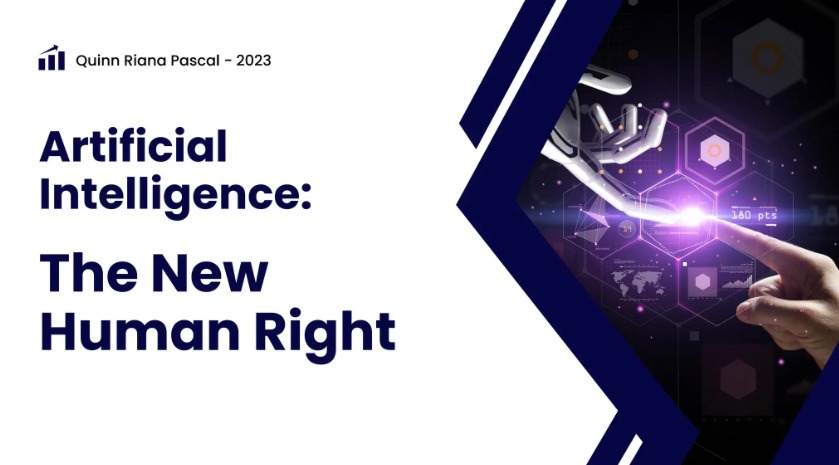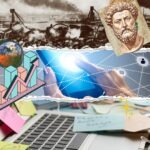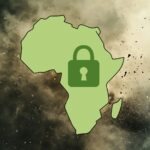Introduction
As we look into the relationship between technology, especially artificial intelligence, and human rights, it’s clear that current laws need to be updated. Technology has been changing the way we live and work, and now it’s changing how we learn. But not everyone has equal access to these tools. Today, I would like to discuss the growing importance of ArtificiaI Intelligence in education, the challenges many face in accessing it, and what we can do about the digital divide.
History of Technology in Context of IR
Technology has played a key role in shaping the global landscape. From the industrial revolution to the age of information, technological advances have caused globalization. Each era of tech has brought nations closer by facilitating international communication, it has blurred cultural lines, and reshaped geopolitical dynamics. As technology continues advancing, its influence on globalization is undeniable, bringing both incredible possibilities and significant challenges.
Upcoming Power of AI
AI is the next big leap, a new revolution. It’s not just a tool; it’s a paradigm shift. With AI, humans can tap into a super-tool that redefines how we learn, communicate, and exist in our daily lives. However, with this potential comes responsibility.
Some people argue that it will make us lazy by doing our work for us. However, when used responsibly the powers of algorithms with HUMAN intelligence can take us further than we or AI could go alone. We are in a developmental boom.
With the progress of AI, students can learn any topic, get help with their current studies, and learn more effectively. Everyone learns differently and the AI algorithms can help give each student the personalized plan they need. Because of the new possibilities for learning, AI has become an essential part of education in 2023 (UNESCO, 2023).
Not only learning in school but in every aspect of life, websites like Bard and OpenAI can help tackle daily problems, teach us life skills like how to grow our own food, it can even create business plans. Someone with access to AI can learn literally anything. Because of this, I’d like to talk about the right to education.
Universal Declaration of Human Rights
The Universal Declaration of Human Rights (UDHR), most recently updated last year to include rights related to climate change- has not been updated since the era of AI.
Article 26 of the UDHR states that “Everyone has the right to education. Education shall be free, at least in the elementary and fundamental stages.“ in the age of technology, education has become deeply linked with access to wifi and tech resources.
If students have the right to Education, they have the right to Artificial Intelligence tools.
The setbacks between reality and AI as a human right are far and wide.
Many countries are still under development and don’t have access to internet, others have just begun to implement Wi-Fi and are lacking the tools to use it properly (like computers, tablets, phones).
On a political level, since technology is almost synonymous with globalization and comm , there are tons of countries that are being left behind and left out of the international system.
Individually, the citizens of those places are also being held back. According to my research, places without access to wifi have a lack of medical access, lower quality of life, difficulties participating socially and economically, and they lack access to education.
“Universal Human rights” are still very far from being universal.
Idealist Analysis
From the Idealist perspective in International Relations Theory,
We can consider possible solutions and think optimistically. The UDHR is a symbol of hope for a just world. Idealism envisions a world where all nations come together through international organizations to reach these collective goals.
We can build a world that truly represents an equal international community. This will require collective action and strong beliefs in the improvement of humankind.
Nations aren’t just defined by their power but by their moral responsibility. From this perspective, developed nations with access to new technologies should help weaker countries. Not for strategic interest but out of a moral obligation, a shared responsibility for equal access to essential tools and global well-being.
The United Nations is the biggest representative of global cooperation. They have crafted laws that reflect our common goals but have yet to be fully applied. By implementing these already existing laws, we aren’t just following legal requirements but we can share a vision of progress and mutual respect.
The rise of AI offers opportunities for human development. By updating the UDHR to reflect the age of AI, we can make education more accessible than ever. It is important to make sure that AI remains a tool for human empowerment, not exclusion. A global change in law could prevent companies like OpenAI from charging for their services. AI gatekeeping contradicts the human right to education.
Conclusion
Idealism reminds us of the potential of human cooperation. As a global community, we have the ability to shape the future of the world. A world divided by technology leaves half the globe disconnected and prevents nations from developing. Making tech more accessible will bring new international actors online.
When education is universally available, it empowers individuals, regardless of their background, to unlock their potential and contribute meaningfully to society. It acts as a great equalizer, it can bridge social and economic gaps.
Developed nations and international organizations need to step up and bridge the rapidly growing gap between countries with technology & artificial intelligence and those without. Doing this can take international relations a huge step forward towards equality, facilitate global development, and reaffirm that access to artificial intelligence for education is a human right.
References
- Kloza, B. (2023, 23 enero). Digital divide in developing countries: Why we need to close the gap – Connecting the unconnected. Connecting the Unconnected. https://ctu.ieee.org/digital-divide-in-developing-countries-why-we-need-to-close-t he-gap/#:~:text=Without%20access%20to%20the%20internet,in%20their%20ed ucation%20and%20skills.
- United Nations. (s. f.). Universal Declaration of Human Rights | United Nations. https://www.un.org/en/about-us/universal-declaration-of-human-rights
- What you need to know about the right to education. (2023, 20 abril). UNESCO. https://www.unesco.org/en/articles/what-you-need-know-about-right-education?TSPD_101_R0=080713870fab2000d9b2e529f854bdf6328305d2742ba3da840423 7ce654c1ec5f13e63a299e061b0865899157143000c3ad253c59e6bc744e87a9a df17d41c3ef21c4d726e5b602fa2cefdf90d5b35d487453ecf51b08090d16dd2ceed 9c5a8#:~:text=The%20right%20to%20education%20is,of%20poverty%20and%2 0into%20society.
- Artificial intelligence in education. (2023). UNESCO. https://www.unesco.org/en/digital-education/artificial-intelligence
- Bard – Chat Based AI Tool from Google, Powered by PaLM 2. (n.d.-b). Bard. https://bard.google.com/
- ChatGPT. (n.d.). OpenAI. https://chat.openai.com/#
- Torreblanca, J. I. (2021, 9 diciembre). Technology. ECFR. https://ecfr.eu/special/power-atlas/technology/









No responses yet